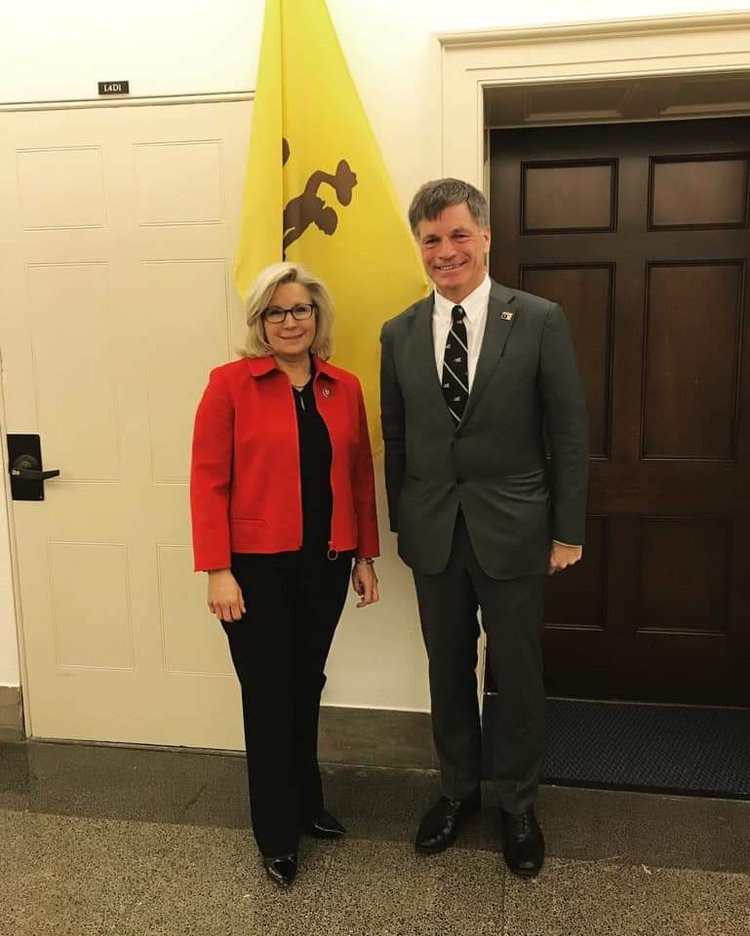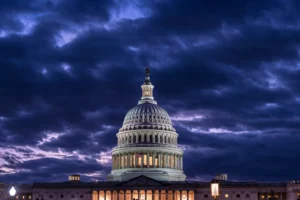The Secret Behind Gov. Mark Gordon’s Enduring Popularity
While other GOP state leaders have elevated culture war issues, Gordon has prioritized local matters, earned the widespread support of voters — and made some enemies in the process
- Published In: Politics
- Last Updated: Oct 10, 2022

Though he was born in New York City, Gordon grew up on a ranch in Kaycee, Wyoming, and is known for his cowboy attire. Gordon attended the annual Cheyenne Frontier Days rodeo in 2021 (pictured above) after the previous year's festival was sidelined due to the COVID-19 pandemic. (Photo via Facebook / Gov. Mark Gordon)
By Jacob Gardenswartz
Special to the Wyoming Truth
In August, Wyoming Republicans again nominated Gov. Mark Gordon for governor, with the incumbent receiving nearly two-thirds of the vote in his campaign against GOP challengers Rex Rammell and Brent Bien.
During the 2018 GOP primary for what would become his first term in office, Gordon barely squeaked out a victory, earning just one-third of the total vote with the top challengers — Harriet Hageman among them — splitting the votes of those who preferred a more conservative candidate.
Gordon’s moderate governing style over the past four years initially earned him few friends in the statehouse. In late 2021, then-Rep. Scott Clem (R-Gillette) labeled him a “tyrant” for instituting a mask mandate during the peak of the COVID-19 pandemic.
Yet a Morning Consult poll released in July found Gordon to be the most popular governor in the nation, tied with Vermont Gov. Phil Scott at 74 percent approval and a record-low 17 percent disapproval. With such widespread support, Gordon sailed through his primary race and is expected to easily defeat Democrat Theresa Livingston in the Nov. 8 general election.
What explains Gordon’s popularity? So far, Gordon has succeeded in balancing support for populist conservatism with a more moderate and pragmatic governing style. While some other Republican governors have sought to raise their national profiles through cable news appearances and political stunts, Gordon’s focus has been on the people of Wyoming, according to the governor’s office.
“Governor Gordon’s policies and priorities – support for Wyoming’s energy and ag industries, his efforts to keep Wyoming on a stable fiscal path, and his belief in efficient, effective and accountable government – are a reflection of what he believes best serves the state’s people,” Gordon spokesman Michael Pearlman said in a statement to the Wyoming Truth. “Regardless of poll numbers, he will continue to make decisions based on what he believes is best for Wyoming’s people and for the future of the state.”
Mark Gordon’s East-meets-West upbringing
Though Gordon’s campaign website notes he “grew up on the family ranch in Wyoming,” he was born in New York City to a family with deep ties to the East Coast elite — his paternal grandmother was Massachusetts heiress-philanthropist Louise Ayer Hatheway and aunt was socialite Jean Gordon.

Gordon, 65, left his childhood ranch for New Hampshire’s St. Paul’s School as a teenager, and later attended Middlebury College, a premier liberal arts institution in Vermont. His contrasting New England and Mountain West upbringing is something that “constantly comes up” in a state where “you’re either ‘local’ or you are ‘from away,’” Gordon said in an interview last year.
After working on the ranch and in the oil and gas industry for much of his life, Gordon’s first foray into politics came in 2008 when he waged an unsuccessful bid to represent Wyoming in the U.S. House of Representatives. That campaign brought with it “criticism among rank-and-file Republicans and even some dark speculation that he is really a stalking horse, a so-called ‘RINO’ (Republican In Name Only) for the Democrats,” according to contemporaneous reporting.
Among the biggest red flags for some in the Wyoming GOP were Gordon’s political contributions to Democrats: $1,000 to Democrat Kathy Karpan in 1996, $2,000 to John Kerry’s presidential campaign in 2000 and $2,500 to the Democratic National Committee in 2004. Gordon ultimately lost the 2008 Republican primary to Cynthia Lummis, who now represents Wyoming in the U.S. Senate; data from the Federal Elections Commission shows Gordon hasn’t contributed to Democrats or groups aligned with them since 2006.
In 2012, Gordon was appointed state treasurer by Gov. Matt Mead after the incumbent died in office, and handily won reelection for a full term in 2014. When Lummis ran for Senate in 2016, Gordon declined to seek her House seat, opting instead to run for governor in 2018. Though that campaign proved difficult, Gordon would soon realize that governing amid the pandemic was much harder.
A tough primary battle, and an even tougher war against COVID-19
On Aug. 21, 2018, Gordon won the Republican nomination for Wyoming governor, beating GOP mega-donor Foster Friess and Hageman by only seven points. That November, he easily took the general election in the predominately-Republican state.
But Gordon’s victory set him on a collision course with then-President Donald Trump, who saw Friess as more aligned with his policies and endorsed him as “Strong on Crime, Borders & 2nd Amendment.”
“President Trump is doing great things that are important for Wyoming in terms of getting our economy going, and all of that,” Gordon said after winning the primary. “But in the end, I think people in Wyoming concentrated on who’s got the experience, who’s got the record and who’s got the best message going forward for Wyoming.”
Gordon’s primary victory came in part with the help of Democrats and Independents who had switched parties to support him, and the issue of crossover voting became a priority for those he’d defeated.
Conservatives lawmakers tried to change the election rules to ban crossover voting. Even before Gordon was inaugurated, Sen. Bo Biteman (R-Ranchester) introduced a bill to ban party changes after May 1 of an election year. The measure and others like it failed to become law, but demonstrated the icy relationship Gordon would face with the conservative majorities in the Wyoming House and Senate.
As the pandemic began, Gordon sought to thread the needle between protecting his constituents and satisfying Wyomingites’ anti-government sentiments. He initially resisted instituting a statewide mask mandate, but closed some businesses and schools to reduce the virus’s spread. As a result, he faced protesters jeering outside the State Capitol, demanding he reopen Wyoming’s economy.
In November of 2020, Gordon tested positive for COVID and soon mandated masks. Though the statewide order was rescinded within a few months, the decision further emboldened Wyomingites who opposed any sort of governmental action against COVID—and opened Gordon up to another line of attack.
But with the worst of the pandemic now in the past, Gordon’s relationship with the state party appears to have thawed as none of his 2018 opponents challenged him this year.
In a statement, Gordon’s office highlighted his efforts to promote in-person learning during the pandemic, increase energy production and rein in the state budget.
“Gordon is coming out strong from the beginning,” said Rep. Dan Zwonitzer (R-Cheyenne). “Over the last decade, we’ve seen an increasing creep of putting legislative bills into the budget bill. I think this is a good pushback.”
Gordon nonetheless continued to face attacks from some on the right, though this time about a new topic: Rep. Liz Cheney.

Gordon’s latest gambit: neutrality
In 2020, when Trump began to claim victory for an election he’d lost, Gordon tried out a new strategy: neutrality.
Though the Associated Press had called the race for Joe Biden, Gordon said he was withholding his congratulations to the winner until “a result is confirmed,” not acknowledging Biden’s victory while also not going so far as to support Trump’s claims.
In December 2020, as some GOP governors filed lawsuits seeking to throw out the election results in battleground states, Gordon sounded supportive. “President Trump has the right to bring electoral issues for resolution in the U.S. judicial system,” he said in a statement at the time. “I, along with Wyoming voters, overwhelmingly supported President Trump through our electoral process.”
But though his public statements demonstrated fealty to Trump, Gordon’s actions showed otherwise. Seventeen GOP-controlled states signed onto the lawsuit, spearheaded by Texas Attorney General Ken Paxton. Wyoming did not.
Then came Jan. 6, when a pro-Trump mob stormed the U.S. Capitol seeking to halt the Electoral College certification of Biden’s win. Gordon’s condemnation was swift: the violence “dishonors our legacy,” he said. “Interfering with the peaceful transfer of power is an affront to the very Constitution that has made our country what it is.” Later that month, he sent upwards of 100 members of the Wyoming National Guard to Washington to assist with security during Biden’s inauguration.
If Trump was already displeased with Gordon for beating Friess in 2018, Gordon’s refusal to bolster Trump’s unproven claims of election fraud further strained their relationship. “You have a governor that has not been too helpful, I must tell you,” Trump told a Wyoming radio broadcaster shortly before his May rally in Casper for Hageman.
As Trump did everything he could to oust Cheney, Gordon again remained neutral, declining to endorse Hageman and again opening himself up to attacks from his GOP challengers.
“When we have somebody like Liz Cheney, who has disgraced the state of Wyoming, I certainly, as governor, would take a position against her,” Rammell said during the gubernatorial primary debate last summer.
“Governors typically don’t get involved in races, and I’m [not] going to do that now,” Gordon responded.
“When President Trump called me and said, ‘Please come to my rally,’ I said, ‘I’m glad to meet you at the airport, President Trump, but I am not going to take sides in this particular race.’”
Most recently, Gordon again forged a middle-of-the-road path by appointing Karl Allred to serve as interim Wyoming Secretary of State, until Chuck Grey, who is running unopposed, is officially elected in November. While Marti Halverson, former state lawmaker and prominent anti-abortion activist promised to overhaul state elections in her application for the position, Allred sought to preserve the status quo.
Looking forward, Gordon’s office said in its statement that the governor is focused on the issues that matter to Wyoming, citing workforce development and K-12 education as two top priorities for his next term.
Gordon’s pragmatic approach has resonated not just with Wyomingites but also with the Republican establishment. He may not be Trump’s favorite GOP governor, but he’s caught the eye of other national leaders.
“Governor Gordon has delivered on his promises, cut wasteful spending and beat back Joe Biden’s attempts to tear down Wyoming’s oil and gas industry,” said Chris Gustafson, spokesman for the Republican Governors Association. “Wyoming is in a stronger position under Governor Gordon and Wyomingites look forward to four more years of strong leadership and prosperity.”













